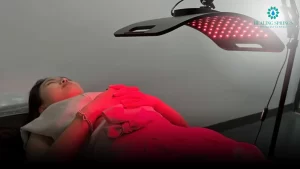
Does Holistic Therapy Really Help Anxiety? Here’s What You Should Know
Does holistic therapy for anxiety actually work? Explore the science behind meditation, nutrition, acupuncture, and natural treatments for lasting anxiety relief.
An important part of inner healing work is acknowledging the part that your family history has played in some of the trauma you carry. Everyone you meet is either actively breaking the cycles of generational trauma or repeating the cycles. It’s a brave choice to be the cycle breaker – which I believe you are!

It’s brave because healing is incredibly sacred work that requires you to stand in the gap for your family and say, “These dysfunctional cycles end with me.”
I don’t know the tough things you’ve had to endure but I can commend you for noticing the pain that has traveled through generations to get to you. Pain comes in many forms; anxiety, abuse, alcoholism, a culture of silence, depression, poverty, poor family relationships, problematic behavior, etc.
The trauma is not your fault, your troubled childhood was not your fault, and even now as you struggle to heal – what happened to you was not your fault.
To understand generational trauma, it’s important to know what trauma is. It’s the emotional response to a distressing life event like abandonment, abuse, accidents, chronic illness, disabilities, divorce, death, infidelity, infertility, violence, sexual assault, and oppression.
Generational trauma happens when the first generation in a family goes through a life-altering event/trauma and they don’t heal from it. Our bodies store pain and trauma so if we don’t heal from it, it becomes encoded as part of our genetic composition (genes) which shape our personality, behavior, and beliefs. If the first generation doesn’t heal the trauma, it gets passed on as genes to the second generation and subsequent ones until someone decides to heal it.
“Trauma in a person, decontextualized over time, looks like personality. Trauma in a family, decontextualized over time, looks like family traits. Trauma in a people, decontextualized over time, looks like culture.” – Resmaa Menakem
Healing is the best thing you can choose for yourself, your loved ones, and generations after you. As you heal those generational wounds, you are making room for better patterns and beliefs. You get to write new family stories and start new traditions – such a powerful choice! If you are wondering where to start, let me walk you through it;

This healing work is beautiful – no matter how hard it gets. You are liberating generations that came before you and those ahead of you. You are, in every sense of the word – a disruptor! The good kind of disruption that creates a wildfire of change. Your life will never be the same again once you start healing generational trauma. It will feel much more rewarding and wholesome.
At Healing Springs Wellness, we would like to be a part of your healing journey. Schedule a free 15-minute phone consultation for trauma counseling.

Does holistic therapy for anxiety actually work? Explore the science behind meditation, nutrition, acupuncture, and natural treatments for lasting anxiety relief.

Men’s Mental Health Month raises awareness about rising suicide rates, depression, and stigma. Learn why June 2026 is critical for supporting men’s mental health.

Explore red light therapy benefits for anti-aging, pain relief, muscle recovery, healing, and skin rejuvenation backed by science.

Learn the meanings, uses, and healing power of Reiki symbols, how they work, and why they enhance energy healing practices.